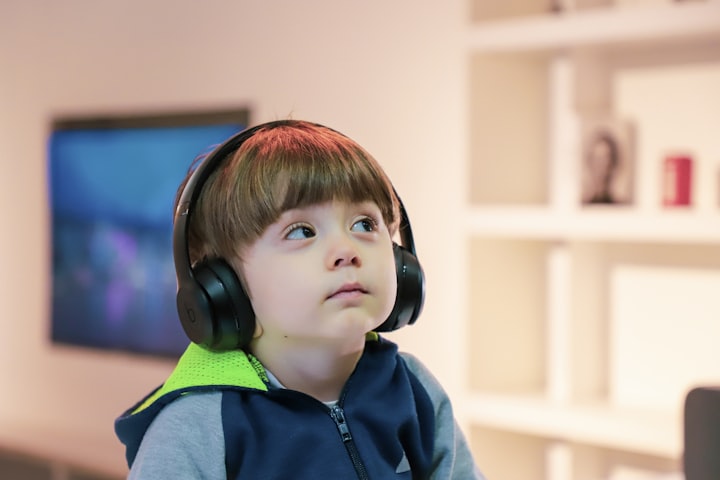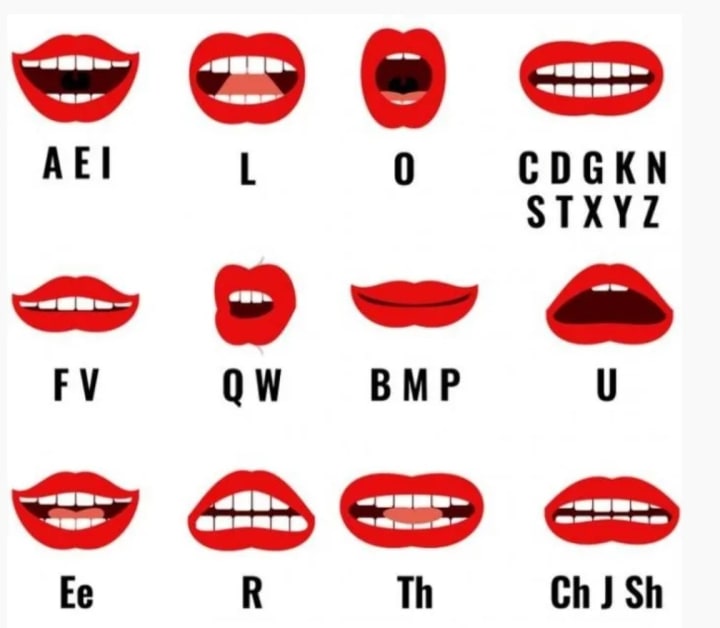When Words Get Tiring
Understanding how listening and lipreading is hard, tiring work.

We know that communication is an essential component of our daily lives - allowing us to connect, understand, and navigate the world around us.
But this can be challenging for those with hearing loss, for both children & adults. The traditional view is that they should learn to hear, speak, and lipread. Otherwise, they will not succeed in 'hearing' society.
About Lipreading
Lipreading, or speechreading, is watching the speaker's lips and facial movements to figure out what is being said.
The problem here is that roughly 40% of the spoken sounds in the English language can actually be seen on the lips, the rest are done in the throat or with the tongue.

As you can see from the picture, one lip movement can be associated with several letters or sounds.
Compare saying these words in a mirror without sound:
- CHAIR / SHARE
- BIKE / MIKE
- SHOW ME / STUPID
- 15 / 50, 14 / 40, 13 / 30, etc.
- ISLAND VIEW / I LOVE YOU
- PITCH / MITCH / BITCH
You get the idea.
Listening with Hearing Loss
Many people assume having hearing loss is hearing things quieter. Well, yes and no. Hearing loss also impacts how you hear words, not only are they "quieter", some word sounds disappear altogether.
Usually, high-frequency sounds are the first to go in hearing loss, so you start losing the ability to hear:
- Consonants like S, F, TH, CH, & SH
- Women's voices
- High-pitched environmental sounds - birds, alarms, kettles whistling
Here's a hearing loss stimulator to get an idea.
- Minimize background noise
- Pick a bright area to see clearly
- Speak clearly, don't have things in your mouth or your hand in front of your face
- Let them know the topic (and when it changes)
- Be Patient
- Never say "Never Mind", or "I'll tell you later". This is a major pet peeve among those with hearing loss.
As you see, background noise affects how much you can understand too.
There's a misconception that yelling will help. No, it does not.
First, it distorts your lips so lipreading is impossible,
Secondly, people say words differently when yelling, plus louder sounds can even hurt. (And for Deaf folks who can't hear anything - you look pretty stupid yelling, to be honest).
Another myth is to enunciate your words "CAAAANNNNN YOOOOOOUUUUU UNNNNNDEEEEERRRRSTAAAAND MEEEEEEE?"
Stop. Just stop. Again, this distorts the words and makes things harder.
To help someone with hearing loss during a conversation you can:
Understanding Hearing Loss
It is important to note that those with hearing loss experience it differently. Different types and levels of loss impact how one hears - even with hearing aids or cochlear implants.
Please remember that a Hearing Aid or a Cochlear Implant is not a cure. One cannot put it on and hear perfectly - like getting prescription eyeglasses. (My own prescription glasses can only get me up to 20/100 vision).
There's also a lot of work that goes into learning how to hear again, I explain this in my previous article.
There's also a big difference between "hearing" & "listening". Hearing sounds is easier than hearing and understanding speech. Check out my Tik Tok video explaining this. For example, a person with hearing loss may have heard you yell something in the other room, but not what was said.
Listening / Lipreading Fatigue
Now that you have a basic understanding of what is involved in listening and lipreading with hearing loss, let's look at listening and lipreading fatigue.
This fatigue happens because there is a lot of concentration and mental work involved in listening and lipreading.
Those with hearing loss must:
- Recognize and process the sounds or lip shapes as they happen
- Decipher their meanings - "Was that a P or a B?"
- Fill in the missing words with guesswork - knowing the topic helps. "we're talking about today's plans"
- Process what it all means - "Do you wa go vee?" becomes "Do you want to go for a Coffee?"
- Formulate a response. "Coffee? Yes please"
It's a lot of work!

The volume of hearing aids and cochlear implants also feed into this fatigue as we're bombarded with sound. Those new to hearing things - those who didn't grow up hearing, do not have the skills to block out background noise like normal hearing people can. So, no we cannot ignore the air conditioner humming loudly in the background.
So, after a long work or school day of listening and lipreading, we are exhausted!
It's great to have listening breaks - taking off the hearing aid or cochlear implant and being in silence for a while. I like to zone out while reading or surfing the internet, or even taking a nap.
Allow those with hearing loss to excuse themselves and be alone away from the activity when things get to be too much work. Please do not think they are being rude.
Alternate Means of Communication
It's not always possible or desirable for those with hearing loss to learn to listen and speak, and lipread. There are many other ways to communicate effectively and they should be able to choose the best method for themselves.
These options include:
- Sign Language
- Speech-to-Text Apps
- Pen and Paper and writing back and forth
- Typing on Cellphone and passing it back and forth
- CART Service (Communication Access Real-time Translation)
- Gesture more while talking (gives visual cues)
- Giving Lecture notes or Bullet Points ahead of time in class / lecture / meetings
- Turn on the captions during online meetings (Zoom, Google Meets, Microsoft Teams)
It should always be up to the individual with hearing loss to decide their communication preference. Do not come up with excuses not to do it, or substitute another option because it suits you - you're not the one dealing with the hearing loss.
Suspect Hearing Loss?
If you are concerned that you, or someone you know, may have hearing loss, it is important to see a doctor or audiologist for a hearing test.
A hearing test can help to determine the type and severity of your hearing loss, and can also help to identify the best treatment options for you or your loved one.
Please understand that discovering a hearing loss among adults can have an emotional impact and pride will play in getting a hearing aid. Please be patient and work with them through this period on their terms.
Lastly, do not buy hearing aids or listening devices off the internet or tv commercial. Hearing aids need to be programmed to fit your specific hearing loss by an audiologist and a "generic" hearing aid may destroy any residual hearing loss instead of helping you.
I hope this helps you understand how difficult listening and lipreading is and that it is a learned skill - some are better at it than others.
Patience and asking what's their preferred communication method can go a long way in easing fatigue and improving conversations.
About the Creator
Tracy Stine
Freelance Writer. ASL Teacher. Disability Advocate. Deafblind. Snarky.






Comments (1)
You nailed it!!! Being profoundly hearing impaired, your advice to those who aren't is honestly authentic!!! Have personally experienced the yelling, the slow drawn-out speaking, and the hated "Never Mind." ❤️❤️💕